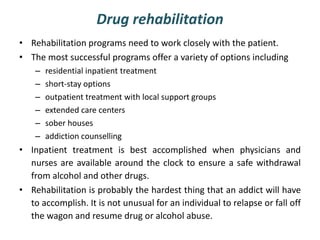See This Report about Drug Rehabilitation
Table of ContentsAn Unbiased View of Drug RehabilitationThe Definitive Guide for Drug RehabilitationUnknown Facts About Drug RehabilitationThe 6-Minute Rule for Drug RehabilitationSee This Report about Drug Rehabilitation
This includes resolving the entire person to make certain that every one of the underlying domino effects of the dependency are correctly taken care of and corrected. This offers individuals the tools they need for a full return to a happy, healthy, substance-free life. Medication addiction "therapy" is a little bit of a deceptive term it implies that people with dependencies are "all much better" after they have obtained some form of therapy.Even people with years of effective recuperation need to stay mindful of their possibility for relapse, and they should utilize the tools they discovered in therapy to stop it. Words "recovery" additionally suggests that someone is being fixed after being mischievous, which is regular with society's preconception regarding dependency. Drug Rehabilitation. Part of the recovery procedure is for people with dependencies, and their households, to learn that dependency is a matter of biology and not principles
Besides, transitioning from physical and mental addiction to a healthy and balanced and delighted method of living is a large adjustment. It is necessary that the steps to medicine rehabilitation be appropriately addressed during the drug recovery procedure. There are four phases of dependency healing: Addiction assessment is a specifically crucial component of the rehabilitation process.
This belongs to the underlying psychology of dependency, and it strengthened by anxieties of apprehension for belongings and judgment from family members and buddies. The analysis procedure requires getting trust and appearing that secretive nature. The specific needs to recognize which compounds were used and the level of their substance usage.
The Drug Rehabilitation PDFs

For lots of people with addictions, anxiety of withdrawal is a major obstacle to leaving their addiction, and that fear keeps them from even attempting. Withdrawal and medication detox do not have to be a terrible experience. By joining a clinical detox program, individuals can survive the experience securely and comfortably.
This is where the underlying reasons of dependency are resolved. For the majority of people with compound dependency, their substance use is no more informative post regarding obtaining high. Instead, it ended up being a recurring, day-to-day process of staying clear of withdrawal signs and getting away from their truth. Drug rehab is the process where the deep concerns around the dependency are identified and addressed.
Some Known Questions About Drug Rehabilitation.
Instead, it can be stated that rehab is the procedure of discovery, while what occurs later is recuperation. The addicted mind usually begins to look at here think specifically after a time period in abstinence that it is OK to try drinking or making use of substances again. However, this rarely works, and the vast bulk of individuals that attempt alcohol consumption or utilizing medications once again will quickly wind up where they were in the past.

Sober living residences are a particularly efficient strategy to aftercare when an individual is released from rehab. Individuals and their family members need to review these choices with their counselors while still in rehabilitation. There are different types of treatment for addiction, based on the level of care provided. When choosing the degree of treatment, the option must be based on what will provide the specific the very best possibility of success in recuperation not on what the individual wishes to do.
This is a poor combination, as it drives numerous individuals to think that they can quit using medicines or drinking by themselves. Therefore, they might hesitate to see moved here and confess that they need a greater degree of care, such as inpatient rehab. Detoxing from a substance is not the same as treatment for substance dependency.
The Greatest Guide To Drug Rehabilitation
Throughout the process of medication detoxification, individuals's minds are jumbled and they really feel literally and mentally ill. They are not receptive to any kind of counseling or treatment until their minds clear and they are really feeling far better. Even though medical detoxification makes the procedure a lot easier, it is best to very first concentrate on making it through the whole detoxification process prior to taking more steps.
Like inpatient treatment, residential therapy supplies the healing impact of eliminating individuals from their useless lifestyle and atmosphere and putting them in safe, healthy and balanced environments. This permits them to reorient their lives and believed processes while concentrating on distraction-free healing.
People receive healing solutions on-site during the day, yet go home or to a sober living center at evening. The strength of the daytime therapy will depend on specific needs and the programs available at the outpatient center. Most people with significant addiction will likely have much better results in inpatient therapy and rehab.
What Does Drug Rehabilitation Do?
Lasting residential treatment programs commonly use a healing approach called the therapeutic neighborhood (TC). This is a technique to re-socializing people whose dependency has actually seriously influenced their capability to match culture. These consist of individuals with severe criminal actions, people that are homeless, teenagers and people with significant mental wellness problems.
 Jason J. Richter Then & Now!
Jason J. Richter Then & Now! Kelly McGillis Then & Now!
Kelly McGillis Then & Now! Shane West Then & Now!
Shane West Then & Now! Michelle Trachtenberg Then & Now!
Michelle Trachtenberg Then & Now! Pierce Brosnan Then & Now!
Pierce Brosnan Then & Now!